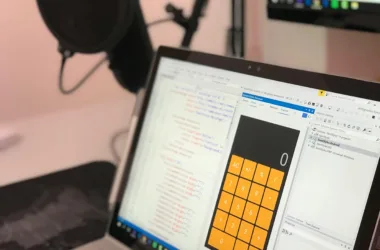Ever wonder why some software engineers get great job offers? They use a smart strategy: open source contributions.
Working on open source projects showcases your skills. It also boosts your career. By contributing to platforms like GitHub and GitLab, you gain real-world experience. You also get to network with others.
Active participation lets you understand community dynamics. You can collaborate on important projects. This helps you build a portfolio that impresses employers.
As you get involved in open source work, you’ll see its impact. It helps not just projects, but the whole software engineering field.
Understanding the Value of Open Source Contributions
Open source contributions bring huge benefits to today’s tech world. They are key for engineers, especially those starting out, to get better at what they do. Over 70% of new developers grow their skills faster by being part of these projects. Taking part in open source lets people face real challenges, boosting both personal and career growth.
Contributing helps in more ways than just skill-building. Open source projects welcome people from all over, creating a rich, diverse learning space. This diversity boosts teamwork and learning. Plus, about 80% of employers look for proof of your skills, like a solid GitHub profile with open source work.
It’s not all about tech skills. Working on these projects hones soft skills through code reviews and project management. Around 60% of folks see personal growth by engaging with the community. This path shows dedication to getting better and helps in standing out to future employers.
There are many key projects out there, like Kubernetes, Django, TensorFlow, Keras, and VSCode. Knowing the worth of open source projects helps match your interests and skills, making your contributions count. Picking the right project is crucial for a meaningful experience and for making lasting connections in tech.
Identifying the Right Open Source Projects
Finding the right open source projects is key for useful contributions and gaining the most advantages. Software engineers should look for projects that fit their skills and career goals. Joining projects that interest you not only keeps you motivated but also helps in becoming a more sought-after developer.
Aligning Projects with Your Skills
Finding projects that suit your skills can change the game. Here are steps to follow:
- Assess your programming languages and technologies you are proficient in.
- Explore project repositories to find initiatives that resonate with your skills.
- Participate in communities that focus on specific technologies.
- Read project documentation to understand the contribution requirements.
Choosing the right projects leads to a good experience and valuable contributions. This helps both you and the community.
Exploring Platforms like GitHub and GitLab
GitHub and GitLab are top platforms for finding open source projects. On these sites, developers can:
- Search for projects by technology stacks.
- Join community forums for discussions.
- Look at contribution guidelines and examples.
- Follow favorite projects to keep up with new contributions.
These platforms make starting in open source easy, offering chances to collaborate and grow professionally.
Open Source Contributions Software Engineer: Building a Strong Portfolio
Open source contributions are a great way for software engineers to build a strong portfolio. Every project you pick up proves your skills in real action. It’s a way to show your talent that counts more than just exams or theory.
Joining community projects has big benefits. About 85% of developers say these projects are great for learning new skills. You get to work with different languages and tools up close. This experience makes your portfolio even better.
It’s smart to pick projects that match what you love and know best. An impressive 91% of developers think working on projects you care about is key. Starting with small tasks can help you get confident. This approach leads to showing off your skills bit by bit.
Meeting new people in the open source world is crucial. 64% of developers find that making friends there opens doors to learning and working together. It shows building a top portfolio is a team effort.
Keep adding to your work to stay noticed in the developer world. Others will see your talent through your active participation. Updating your portfolio often is key to showcasing your growing experience.
Diving into the Benefits of Active Contribution
Being part of open source projects offers many perks, like bettering key skills and knowing the latest tech. These opportunities let developers tackle actual problems. This is key for honing problem-solving abilities. Through active involvement, they gain practical experience that can change their approach.
Real-World Problem-Solving Skills
Open source work puts developers right in the middle of real challenges. Solving these problems improves their analytical skills and self-confidence. The skills learned are very valuable in technology careers. Working together teaches developers about teamwork. They learn from each other and solve problems as a group.
Learning New Technologies and Frameworks
Technology changes fast, so it’s important to keep up. Open source involvement means learning about new technologies and methods. This keeps developers flexible and relevant. They get to try tools and practices not found in regular jobs. This helps them stay ahead and grow in their careers.
Networking Through Open Source Communities
Being part of open source projects boosts your network in the developer world. You meet other developers which can help you find mentors and job chances.
Engaging with Other Developers
Open source is all about teamwork. When you join in, you get to know many professionals with similar interests. This can lead to:
- Working together on tough code problems.
- Sharing ideas and getting comments on your projects.
- Going to events like hackathons and meetups, growing your network even more.
Finding Mentors and Job Opportunities
Connecting in the open source community can help you find mentors. Experienced developers often want to help beginners. Through open source, you might find:
- Guidance from top people in the field.
- Job tips based on your work.
- Team projects that impress future bosses.
Establishing Your Reputation as a Contributor
Building a strong reputation in the open source community is very important. It’s good for your growth, both personally and professionally. Making regular, high-quality contributions will make you more visible. This helps people recognize your skills and dedication.
It’s not just about being active; how you present your work matters too. Showing your skills and hard work clearly is key. This approach can greatly increase your impact in the community.
Consistency and Quality in Contributions
Open source projects offer many ways to contribute. Start with small, easy tasks like fixing errors or improving guides. Many projects have “good first tasks” for beginners. Starting here builds a base for making quality additions later.
Staying involved regularly builds trust and credibility. This helps you get noticed as a reliable contributor. People appreciate those who take feedback well and are truly engaged. Your influence in the developer world grows this way.
Showcasing Your Work Effectively
Gaining recognition means showing your work well. Platforms like GitHub are perfect for this, with over 190 million projects by 2021. A good portfolio draws in companies wanting to hire talented developers.
But don’t just show the finished work. Emphasize the teamwork and community involvement in your projects. This shows you’re good at collaborating. Effectively showcasing your work opens up more opportunities. It makes it easier for employers to see your potential and the quality of your contributions.
Gaining Industry Visibility through Contributions
Working on open source projects gives software engineers a special chance to be seen in the industry. It’s not just about working together, but also a smart way to boost career options. This is especially true in a tough job market.
Participating in Popular Projects
Being part of well-known projects can really make an engineer stand out in the tech world. These projects get a lot of attention, letting developers show off what they can do. It’s a great way to be noticed by those hiring, who often glance at resumes for just a few seconds.
Having impressive open source contributions can really make a resume pop. This can be the key difference when competing for a job.
Leveraging Contributions for Job Offers
Open source work can open the door to job opportunities. Companies value the real-world skills shown in these projects. By demonstrating their skills, developers might get called in for interviews or even get direct job offers.
This way of networking through open source also helps build important industry contacts. It increases both visibility and trust within the field.
Continuous Learning and Skills Development
In today’s fast-changing tech world, continuous learning is key for a software engineer’s career. Working on open source projects helps developers keep up with new skills. This keeps them relevant in a shifting industry. A whopping 87% of developers believe learning new tech is critical for their career progress. This highlights the need to stay on top of trends.
Staying Current with Industry Trends
Contributing to open source projects offers chances to learn and use emerging coding methods. The Bureau of Labor Statistics expects a 22% job increase in software development from 2019 to 2029. Developers need new skills in AI, cloud computing, and cybersecurity to meet this demand. A huge 95% of tech companies see continuous learning as key to their teams’ achievement.
Exposure to Diverse Coding Practices
Getting involved in open source projects exposes developers to different coding styles and tools. This not only boosts efficiency and flexibility but also helps in gaining valuable job market skills. About 75% of developers value contributing to such projects. It strengthens their grasp of sought-after coding practices. Online courses and coding bootcamps are popular for quick skill upgrading, showing professionals’ dedication to stay ahead.
Leadership Opportunities within Open Source
Leadership in open source helps contributors grow their influence and shape projects. It boosts coding and management skills. Driving projects forward becomes possible. Taking leadership roles like project maintainer can skyrocket your career.
Becoming a Project Maintainer
Project maintainers are key to open source success. They oversee contributions, ensure code quality, and promote teamwork. Open source projects have different rules, like the Benevolent Dictator model or the merit system used by the Apache Foundation. Maintainers guide the team and make big decisions.
Learning Project Management Skills
To be a top project maintainer, you must master project management. This involves teamwork, prioritizing tasks, and setting clear roles. Adding governance documents early on sets behavior standards and boosts efficiency. This approach helps create a successful open source community.
The Importance of Giving Back to the Community
Giving back in open source helps the community grow and stay strong. It’s not just for your own good. It’s about helping everyone who codes. A key part is supporting new coders, guiding them as they start their coding path.
Supporting New Contributors
Helping new people in open source keeps the community lively. Those with experience should mentor them. This helps with both coding skills and people skills. Sharing what they know through blogs or videos also boosts their standing, making everyone more willing to share.
Reporting Bugs and Enhancing Projects
Helping out includes finding bugs and making software better. Open source thrives on volunteers to improve, fix, and secure software. Taking part in fixing these issues helps us all. It strengthens our work, benefits users, and builds strong ties between developers.
Documenting and Showcasing Your Contributions
For any developer, showing your work well is key to getting noticed. An online portfolio acts as a strong showcase. It highlights your projects and what you’ve done for the community. Sites like GitHub are great for showing your skills to possible employers, opening up more job chances.
Creating an Effective Online Portfolio
Your online portfolio should show off the best parts of your work. Focus on these important pieces:
- Curated Projects: Choose projects that show you’re savvy with in-demand tech like .NET, Angular, and React. These projects should highlight how you tackle problems and your tech skills.
- Visuals: Add screenshots, GIFs, or videos to make your work stand out and easy to understand. This makes your portfolio more appealing.
- Badges and Certifications: Include GitHub badges to show your achievements. These badges boost your profile’s trustworthiness.
- Clear Documentation: Offer detailed guides for your projects. This makes them easy for everyone to get, regardless of their skill level.
Utilizing Platforms for Visibility
Being active on platforms that get you seen is crucial. Here’s what you should do:
- Look for projects that fit your skills and interests.
- Join in community talks and review code to showcase your teamwork and communication.
- Stick to coding rules to keep your contributions professional.
- Talk about the features, improvements, or bugs you’ve tackled to show your active role.
It’s best to focus on the quality of your work rather than how much you’ve done. Communities often spotlight work that not only hits technical marks but also boosts collaboration and growth.
Securing Work through Open Source Contributions
Being part of open source projects can help you get a job in tech. It shows your skills and commitment, making you stand out to employers.
Leveraging Contributions for Freelancing Opportunities
Open source involvement can open doors to freelance work. Projects often have “good first issue” tasks for beginners. This helps you get noticed within the community.
Making these contributions can turn into freelance jobs or even full-time offers. For example, after contributing patches and interacting with others, many find work that fits their skills.
Building a Professional Network
Creating a professional network is key in tech, and open source helps a lot. Joining discussions and forums lets you meet others in the field.
This way, you find more work opportunities and collaborations. Supporting open source also improves the community, making it easier to find work.
Best Practices for Contributing to Open Source
Contributing to open source is more than just writing code. It’s about making sure your work helps the project. Focus on top-notch code and stay in touch well. This will make your contributions count.
Focusing on High-Quality Code
To excel in open source projects, the core is high-quality code. Here’s how:
- Use clear branch names, like fix-issue-123 for bugs or feature/new-feature-name for new additions.
- Keep commit messages short, under 50 characters, and link to issues or PRs.
- Always review your code to ensure it’s clean and works well.
- Value previous developers’ work to keep the team spirit alive.
Effective Documentation and Communication
Good documentation connects the team, making it easier for everyone. It’s key for bringing new and old contributors up to speed. Always talk respectfully and welcome feedback. This builds a positive space for everyone.
Conclusion
Getting involved in open source projects is a key move for software engineers aiming to advance their careers. This work boosts your technical skills and gets you noticed in the field. It opens the door to making new connections and possibly landing great job offers.
Contributing to open source is more than just writing code. It’s about gaining real-world experience and building lasting professional relationships.
Open source contributions are vital because they fuel innovations that change industries. Tools like Linux, Apache Hadoop, and TensorFlow have had a huge impact. By joining these projects, developers help push technology forward. At the same time, they improve their own skills and portfolios.
Open source work is incredibly rewarding for anyone in software engineering.
Getting involved in open source helps not just your own career but also strengthens the tech community. By working on widely used software, like Mozilla Firefox and WordPress, developers tackle common hurdles together. This teamwork drives innovation.
This mutual effort shows a commitment to improving technology for everyone. Start contributing to open source now and see the amazing opportunities it brings.






